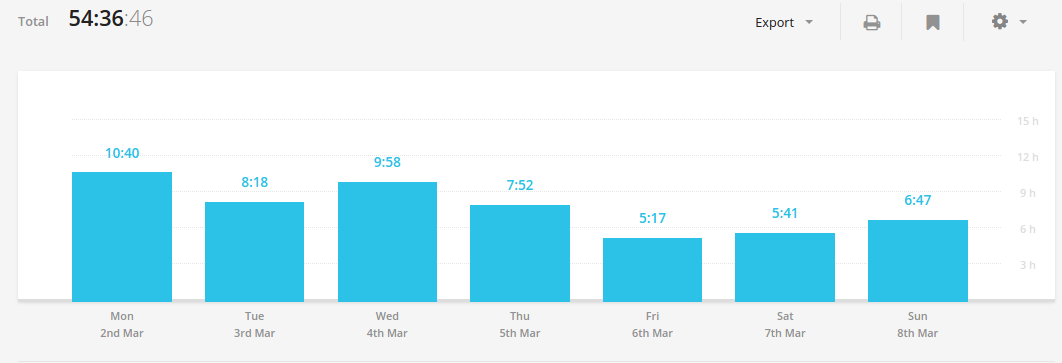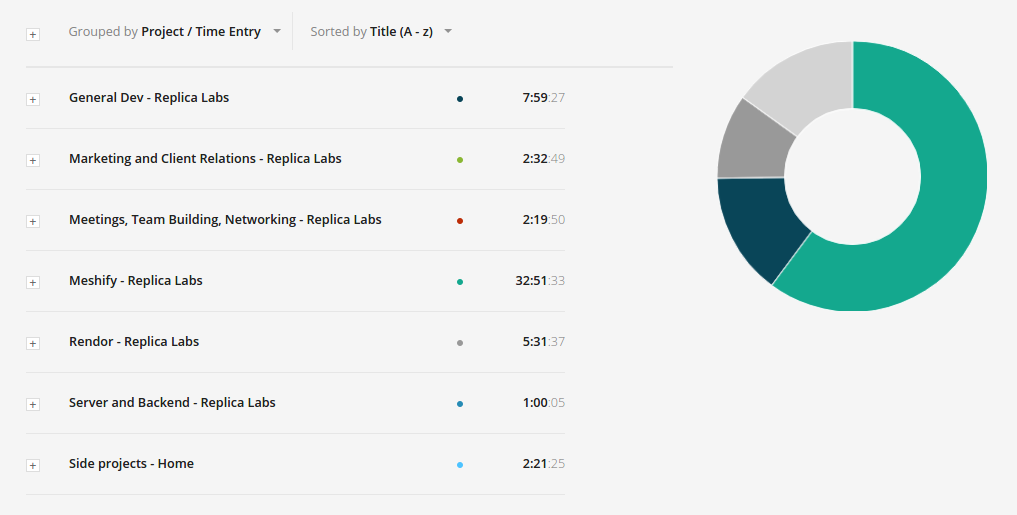For the last year, I’ve been looking for methods to spend my time more productively. It’s been incredibly enlightening, and I have in fact become a more productive person, but I’m not interested in creating a list of tips and tricks letting anyone complete their todo list in a day (at least not here). Instead, with this year behind me, I find myself asking if striving for ever-more-productive means of doing things is worth it.
This question seems obvious, but I’ve found two very different answers for myself, and reconciling them has not been easy. To give you a better idea of why I even started this quest for productivity in the first place: it was borne out of necessity. A year ago, I was still part of both a PhD program and a company that I helped found. As you might imagine, this was not the easiest thing for me to do, especially given how inexperienced I actually was at both (something I didn’t dare admit to myself at the time), so I looked for ways to do more with the limited amount of time I had. Now that I’ve dropped one and devoted myself to the other for a while, I have a clearer head about the whole thing, which is why I’m allowing myself this little bit of introspection[1]Do a Google image search on ‘success’, and apparently it just means people with their fists in the air..

First Answer
The engineer in me says, “Of course”. Saving time is a good thing, because it gives you time for… other things that take up time. But more intelligent things. If you’re spending a day on some stupid, repetitive task, it makes sense to automate that task, or find a better way of doing it, so that you never have to waste your time again. This is actually the premise of a lot of engineering: if you’re doing the same thing over and over again, you’re probably doing it wrong.
This line of reasoning appeals to my nature in so many ways; I can’t tell whether I’m a computer scientist because of this philosophy, or I have it the other way around, but it’s a big factor in my attitude towards work. My worst days - at work or otherwise - are when I’m faced with a task that I don’t know how to optimize. This goes for anything: gaps in my knowledge that prevent my code from compiling; a paper that I can’t speed read (I’m looking at you, two-column small font pdf); waiting at the DMV.
The last one is sort of a cop-out, but you get the idea.
So, according to the engineer in me, this process has fulfilled my every dream. There’s always a better way to do things, I understand, but one of my biggest accomplishments this year is that I can now identify and implement these better methods of productivity, efficiently. I don’t just feel like I read faster, type faster, learn faster: I know I do. The best part is that I still have room to grow[2]No, seriously, go try it now. You’ll get a couple of things, but most of stock photos look like this..

Second Answer
The other answer was a concept that took me much longer to grasp than the first. My 22-year-old self didn’t realize that doing things better/faster is not an excuse to do more things; so, I did all the things. This struggle is best demonstrated by, what else, one of my many tools for productivity. Toggl is a time tracker that I use during work days, allowing me to see where I spent most of my time (or didn’t). Here’s my work week from the 2nd - 8th of March 2015:

There are studies that show working 55 hrs/wk or over actually prevents you from being more productive. I did not know this at the time. The only things apparent to me were
- There’s a lot to do.
- Someone needs to do it now.
- I am someone.
The graph above actually represents a much longer week than 55 hours. This is only when I was head-down at the computer, and felt I was actively contributing to a project (which I can show with another handy chart).

Looking back, it was totally overkill and probably not worth it, but at the time I considered this week one of my best! I felt like I got a lot done, and left my computer every day satisfied.
However, work and life are two very different things. These sorts of weeks continued on; tasks got checked off at a good clip, but I found myself getting more and more exhausted. Exhaustion led to anxiety. Anxiety led to depression. I experienced emotions that I hadn’t felt since I was an angsty teenager[3]System of a Down. Braces. Manga. It was quite a time.. The fact that I was experiencing these things angered me even more, since I associated such feelings with immaturity. This led me to bury myself farther into my work, which led to more inner conflict, and on, and on.
Eventually, I completely burned out. The whole overwork-and-crash thing is a tale as old as time, but it’s the first time I can remember it truly happening to me, and in a way, it was my search for productivity that took me to the brink. If anything, it made me realize that my well-being does not rest upon the work that I do, and in fact could be hindered by the motivations that make work so important to me. More does not mean better. My attitude towards work needed to change.
Productivity is Still Great
All of that being said, this year’s experiments in productivity have absolutely been worth it, and I’m glad I built up the habits that I did. My problem was that I believed implementing these more productive habits would only require a mental shift: switch from this program to that, stick to a strict schedule. In reality, the shift that I needed was emotional. My natural mental state craves productivity, but it’s much more of a stretch for me to maintain this mental state while also balancing my strongly-held beliefs in perseverance and completion. I don’t have to sacrifice one for the other; I just have to redefine what success means for me. These new productive habits, paired with my own introspection, have allowed me to structure my life in a way that’s now both good for my health and my work.
Here’s hoping that I can keep it together until my next birthday[4]Another successful person shaking his fists at the only thing that can outshine him: the Sun. It will rue the day..
